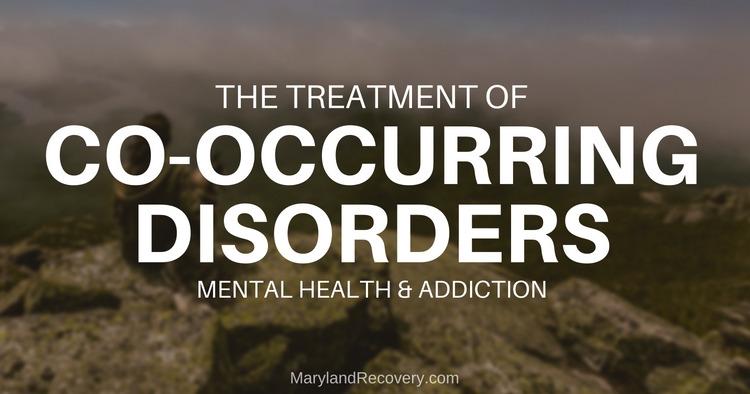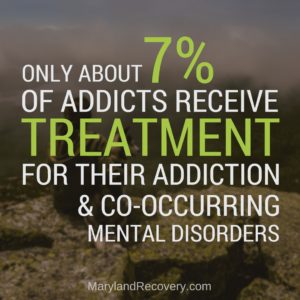 Many people with addiction became dependent on drugs and alcohol because they were – if unknowingly – self-medicating for a mental illness. Many people struggling with both a mental disorder and an addiction may have had trouble in the past – finding the right treatment was difficult because most clinicians treated one or the other, not both. Full and permanent recovery was not always possible. Currently, though, doctors and counselors understand addiction may be part of a larger problem.
Many people with addiction became dependent on drugs and alcohol because they were – if unknowingly – self-medicating for a mental illness. Many people struggling with both a mental disorder and an addiction may have had trouble in the past – finding the right treatment was difficult because most clinicians treated one or the other, not both. Full and permanent recovery was not always possible. Currently, though, doctors and counselors understand addiction may be part of a larger problem.
If you have a drug or alcohol addiction, it is important to know whether mental disorders play a role in your dependency. Knowing your symptoms makes it easier to get a dual diagnosis, which gives you more treatment options and increases the chance of full recovery. Most of today’s drug rehab facilities are familiar with dual diagnoses and offer individualized treatment plans for several mental disorders.
How Common Is Dual Diagnosis?
According to the National Survey on Drug Use and Health (NSDUH), almost 9 million alcoholics suffer from mental disorders. This number of mental disorders increases when other addictions, such as prescription medications, marijuana, heroin, and cocaine, are considered. However, only about 7% of addicts receive treatment for their addiction and co-occurring mental disorders. This is out of the scant 55% who seek any help. Additionally, about 23% of people with addictions and mental disorders are homeless, making it harder to seek and pay for treatment.
People with addictions and co-occurring mental disorders have much harder times building productive lives. They struggle to get and keep jobs, which negatively influences financial stability. Their relationships suffer, sometimes because the people around them don’t know where the mental disorder ends and the addiction begins.
Risk Factors For Co-Occurring Mental Disorders
Addicts with co-occurring mental disorders struggle to raise and keep custody of children and pets. They are more likely to develop more than one mental disorder. For instance, an alcoholic with depression may develop schizophrenic tendencies due to alcoholic hallucinations. These people often live in marginalized circumstances and are dependent on family or government assistance.
Many mental disorders are hereditary. Sometimes, this makes it easier to diagnose the disorder, so understanding family history can be crucial. However, mental disorders with genetic components can be harder to treat. Additionally, the younger you are when your addiction developed, the more likely you are to sustain a mental disorder.
Understanding The Differences Among Disorders
Drugs and alcohol severely impair brain chemistry, influencing the production of chemicals like adrenaline, serotonin, endorphins, and dopamine. The younger a brain is, the faster it adjusts to substance abuse; such a quick adjustment makes recovery difficult. When the brain no longer receives a “high” from drugs or alcohol, it reacts as if it is injured. Over time, this causes or exacerbates depression, anxiety, and other disorders. It also impedes the ability to concentrate and complete tasks, necessary life skills for work or school.
Some mental disorders have neurological components; they connect to certain neurotransmitters in the brain. Substance abuse increases the neurotransmitters’ impairment, which increases mental disorder symptoms. Neurological factors may cause a mental disorder to develop sooner than normal after you begin an addiction.
Finally, people who’ve experienced trauma are at high risk for substance abuse and co-occurring mental disorders. Traumatic responses can occur whether the individual experienced a traumatic event firsthand or “inherited” behaviors from traumatized family members. Trauma increases your “fight or flight” response and adrenaline production. It also leaves you vulnerable to disorders like post-traumatic stress disorder (PTSD), complex PTSD, and depression. Drugs and alcohol numb these symptoms temporarily, but they will eventually worsen them.
Links Between Mental Health And Substance Abuse
 Most people recognize self-medication as a link between addiction and mental health. Addicts normally have low self-esteem, so they engage in harmful thought patterns. They may tell themselves they are worthless, stupid, and not worth helping. If the addiction is entrenched, an addict may think, “I need this substance to feel normal.” Alcohol, illegal drugs, and prescription pills “turn off” these thought processes temporarily.
Most people recognize self-medication as a link between addiction and mental health. Addicts normally have low self-esteem, so they engage in harmful thought patterns. They may tell themselves they are worthless, stupid, and not worth helping. If the addiction is entrenched, an addict may think, “I need this substance to feel normal.” Alcohol, illegal drugs, and prescription pills “turn off” these thought processes temporarily.
However, self-medication is not the only reason addicts have co-occurring mental disorders. Many addicts have legitimate medical symptoms such as anxiety, panic attacks, and insomnia. Without healthy coping mechanisms and a strong support system, they will depend on medication, alcohol, or illegal drugs as their only sources of relief.
Addicts don’t care about rules or boundaries – they care most about what will relieve their suffering. Consequently, many addicts engage in risky or violent behavior to satisfy cravings. They often abuse or neglect loved ones, sustain severe physical injuries, and become unable to regulate their moods. After an episode like this, guilt and self-recrimination set in. The addict turns back to his or her drug of choice to deal with anger, depression, and other after-effects of abusive behavior.
Common Co-Occurring Disorders
Addicts have many different co-occurring disorders. Depression, mood disorders, and even psychosis are common because of how drugs and alcohol affect brain chemistry and moods. Many addicts also experience anxiety, and a great number are actually addicted to anxiety medications like Xanax or Valium.
Eating disorders are common in addicts, because of drugs and alcohol siphon the appetite. Some anorexics use alcohol in place of food, leading to a disorder called drunkorexia. Those who don’t develop actual eating disorders often experience malnutrition simply from substance abuse.
Understanding Complex Mental Disorders
Some addicts have schizophrenia, bipolar disorder, or other complex mental disorders that are often difficult to diagnose. Because these disorders are particularly difficult to diagnose and treat, people begin to use illegal substances to help them deal with the issues of day-to-day life. Over time, reliance on prescription medication can become a dependency.
People with attention deficit disorder/attention deficit hyperactivity disorder (ADD/ADHD) are another at-high risk group for developing substance abuse. Doctors place most people with these disorders on meds like Adderall or Ritalin. These can be useful in treating ADD/ADHD, but they have amphetamine components, so they act like drugs that speed up the body, like cocaine and methamphetamines. Additionally, ADD/ADHD affects the part of the brain doctors know the least about – the one that controls arousal. Therefore, ADD/ADHD drugs often produce harmful highs and lows that contribute to abuse and mental disorders.
Do I Have A Co-Occurring Disorder?
If you use drugs or alcohol primarily to control painful emotions or memories, you may have a co-occurring mental disorder. Other warning signs include intense mood swings, sadness, or anger that lasts longer than two weeks, or persistent thoughts of death and suicide.
You may also have a co-occurring disorder if you have been treated for addiction before but weren’t able to maintain sobriety. Your doctor or counselor may not have recognized the signs of a more serious problem or may have treated your mental illness and addiction separately. It is best to seek a program that treats addiction and mental disorders simultaneously.
Getting A Dual Diagnosis
Not every addict has a mental illness, but it is often a way to handle the pain of a mental illness when is has not been diagnosed. Therefore, it’s crucial to get a dual diagnosis from a qualified physician. He or she will begin with a physical examination to ascertain whether your addiction treatment should include certain health components. Afterward, you may receive a referral to a psychologist or licensed professional counselor who can perform a full mental health evaluation.
When you begin treatment, let the professionals at your facility know about your dual diagnosis. Bring medical paperwork with you, as well as the contact information for any professionals helping you.
Can’t I Detox On My Own?
Some addicts with mental disorders fear the stigma of their conditions, so they try to detox alone. This can actually be dangerous. Many drugs such as Xanax, Valium, Suboxone, and illicit drugs like heroin and cocaine have short half-lives. In other words, they process through your body faster, which speeds up withdrawal symptoms once you’ve taken the last dose. Additionally, alcohol and most drugs carry withdrawal symptoms like seizures, severe vomiting, and delirium tremens. A medical professional can help ease the pain of withdrawal.
The psychological side of dual diagnosis also makes detoxing alone dangerous. Without support, you will most likely experience the original psychological symptoms, such as anxiety and panic attacks. These will feed into other mental disorders. Many addicts with co-occurring mental disorders develop malnutrition, are unable to perform basic self-care, or attempt suicide. However, continued access to mental health professionals decreases these risks.
The Treatment Of Mental Health And Addiction
Today’s drug therapies are more multifaceted than those of the past were. Most facilities offer a variety of choices including cognitive behavioral therapy, psychodrama and role-playing, art and music therapy, fitness therapy, yoga and much more. There are also nutritional components for those suffering from malnutrition.
When you check into a detox facility, you’ll get a treatment plan tailored to your needs. You will undergo medically supervised detox first, which integrates physical and mental health. Contact us today if you have questions.
Innovative Dual Diagnosis Treatment in Maryland
Reviewed by Christopher Schwartfigure MS, LGPC, CAC-AD








